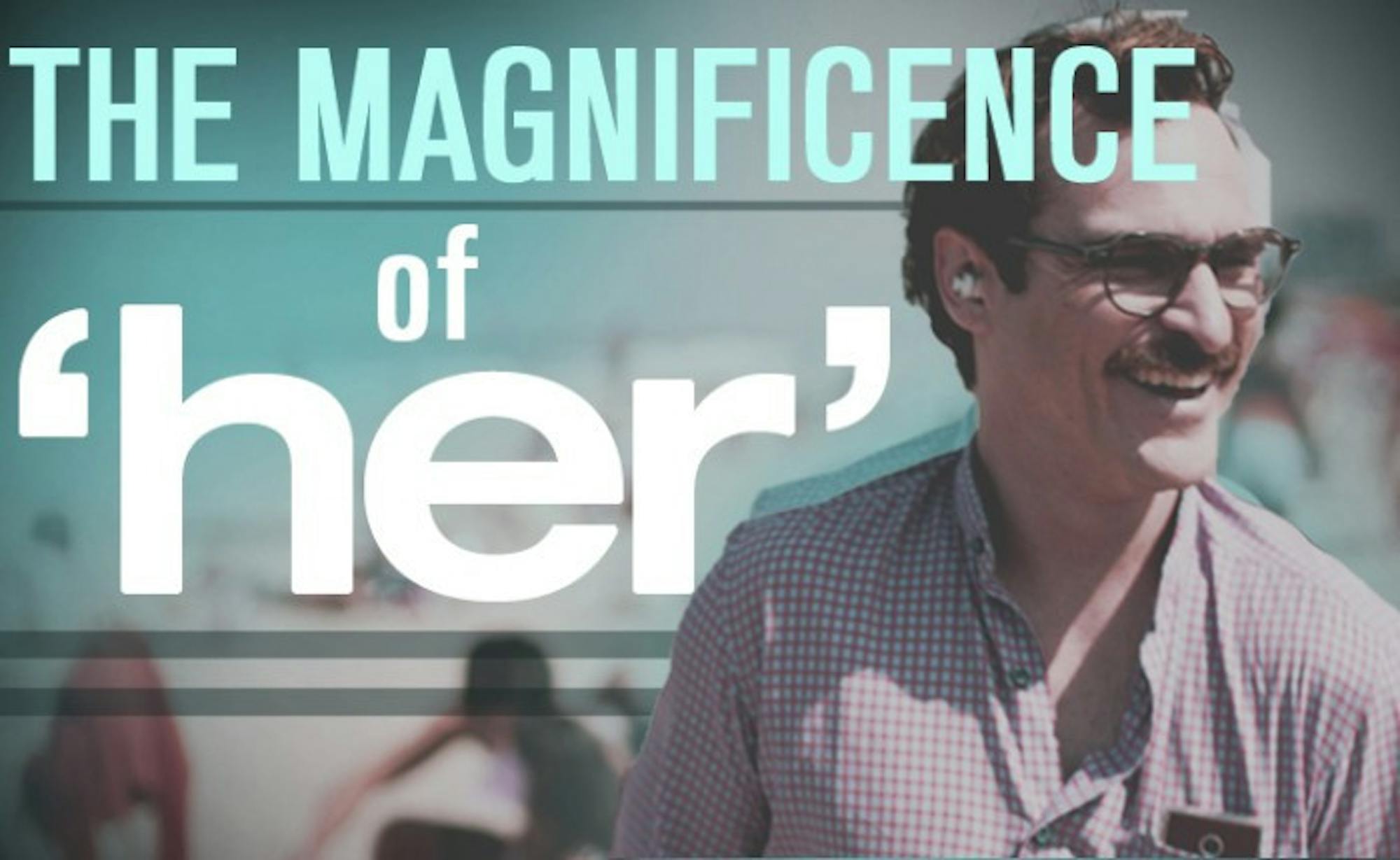
Filmmaker and Renaissance man Spike Jonze cultivates emotional resonance in the strangest places. His team-ups with Charlie Kaufman, the most adept and peculiar writer in cinema, have seen tremendous heartbreak and consciousness despite — or, more appropriately, through — absurd, surreal premises. With 2013’s spectacular “Her,” Jonze continues his streak of unrivaled filmmaking in his first individual directing and writing effort.
The film opens with the first of many subversions, as Jonze explores his newest playground. Anyone vaguely familiar with the plot of “Her” seeing it for the first time assumes they are being planted into the middle of the story; instead, Jonze slowly introduces main character and personalized greeting card writer Theodore Twombly (Joaquin Phoenix), along with the extremely intimate, close-up direction employed throughout the film. Despite the dramatic subject matter, Jonze naturally weaves in tinges of humor, like in his previous works, by examining the conventions and implications produced by the world he created.
And so masterfully do Jonze and company create this setting. A near-future Los Angeles appears just beyond the modern world’s reach, very aesthetically sleek — as usually imagined of the future — with a smooth, warm palette, cinematographically. Similarly, the magnificent swelling-yet-minimalistic score perfectly accents the refined moods of every scene. Still, when Theodore heads home from work after the first establishing scene, everything looks and feels subtly bleak, like the advancements to technology have put everything at society’s fingertips, except they have stripped away humanity and social connection — Theodore jokes with a friend, “I can’t even prioritize between video games and Internet porn,” but we know this to be a more sobering statement of fact.
Through a series of face-tracking shots, Theodore uses a crowded elevator, rides a full train and walks down a lovely, expansive bridge against a sprawling L.A. skyline. However, like the direction suggests, he’s completely alone, assumedly just as each other person is around him. He whispers to his earpiece — a more developed version of Apple’s Siri — asking for a melancholy song, browses the news and checks his email. It is all rigidly formulaic, as though Theodore has mopily followed this routine every commute for a long time.
Quickly we learn he has gone through a separation with his wife, Catherine (Rooney Mara), and he buys the latest operating system upgrade for his earpiece to sort out his life — an operating system capable of consciousness. The tonal accuracy of the flashbacks revealing his relationship with Catherine is unparalleled, and Mara commands in a brief but scene-stealing role. In mourning of the two’s falling out, Theodore recalls only the fond memories, idealizing his relationship — and thus hanging himself up on it — to paralyzing effects. Phoenix’s careful reactions and line readings often play a quiet grimness, which Jonze expertly captures by keeping the cameras fixed on the actor’s face, though off-centered to underscore Theodore’s lack of companionship.
When Theodore installs the new OS — selecting a female identity — a hesitant, raspy but distinctly human voice greets him. Her name, he asks, is Samantha (Scarlett Johansson) — a response he receives in no time, but by her explanation that she read an entire book and settled on the name, he learns the absolute depth of the OS’s programming. As the premiere accompaniment for each other, Theodore and Samantha quickly bond, relying on each other as confidants, ostensibly always there for each other.
At first the two have a playful friendship: Theodore laughs, “I can’t believe I’m having this conversation with my computer,” when discussing dating with Samantha. She tellingly replies, “You’re not! You’re having it with me.” Soon, Samantha’s increasing curiosity and dutiful utility coupled with Theodore’s newfound excitement bring the two closer, eventually beginning a romantic relationship and professing their love.
Jonze uses the futuristic conceit to comment on and critique the effects of today’s technology. People have the means to always reach one another, giving them the ability to connect much more rapidly and expedite relationships. However, this constant connection is also caustic, creating unrealistic expectations and worrisome uncertainty with even the briefest moments of noncontact — and this sentiment does not only apply to relationships, but for anything we become reliant on and immersed in technology.
Theodore and Samantha’s relationship experiences many of the same stages as any human relationship, blurring the nonhuman aspects of the OS, while simultaneously highlighting them. There’s the honeymoon phase, the subsequent fallout, the settling-in turned to complacency that could break down when faced with any kind of wrench and the attempts to salvage. In this case, the two face very opposing issues attached to their states of being: Samantha yearns to evolve, not constrained by the limitations of humanity, while Theodore, stunted by his humanity, rehashes the difficulties he saw with his wife.
These pangs come to a head when both have pivotal interactions with those outside the scope of their very insular relationship. Only after Theodore meets with Catherine again does he remember their struggles, for some of which he was responsible. He has his issue and seeking comfort in a rapidly advancing OS might not help him address them. Meanwhile, Samantha sees the disparities between humans and artificial intelligence through contact with other operating systems. In a gradual and beautifully implicit turn of realization, she determines not only is the relationship holding her back from technologically evolving, but equally it is holding Theodore back from emotionally evolving.
Spike Jonze fully commits to every concept he tackles in his work. Someone falling in love with his or her OS may seem implausible, but the earnest angle Jonze takes in portraying the relationship suspends the absurdity and allows acceptance. As a result, the film is a timeless, intimately personal conversation about relationships and coping, while concurrently discussing burgeoning, perhaps unconsidered, current and future implications, ethics and morals concerning our society’s interactions with and through technology.
Human beings are finite. They are imperfect, flawed and are bound to make mistakes. They do not have all the answers, nor the ability to search for them in milliseconds. Realizing this and finding those you can love despite — nay, because — of those qualities is what a relationship of any nature truly boils down to. This takes mutual effort, collaborating to evolve together in ways that people are compatible. These differences complicate Theodore and Samantha’s relationship and would do so to any human-operating system relationship. Their relationship —in addition to Theodore’s job writing other people’s emotionally weighty cards —also underlines the inherent risk present interacting with others solely online or, rather, not face-to-face. Either person can gather skewed or unrealistic representations of the other because both have the ability to shape, put forward and even view idealistic versions of themselves or one another.
At its emotional core, still, “Her” shows that pain is not the end; pain might remain a necessary component in healing, but it is far from the end on which to dwell. As Theodore walks up to the roof of his apartment building with his good friend Amy (Amy Adams, outstandingly playing a hybrid optimist/voice of reason for Theodore), he’s relieved of his pervasive OS, free to experience his surroundings and connect with other, similarly free, humans. This final subversion in Jonze’s futuristic love story provides a slight, uplifting end, offering hope for the flawed humans, incapable of the transcendence of their artificial counterparts. Melding all of his varied, complex ideas into not just a clear and digestible, but immensely enjoyable, movie, Jonze has created another one of the most thought-provoking, stunning and all-around well-made films in recent cinema.
“Her” is playing on campus as the SUB Movie of the Week. Showings Thursday-Saturday in DeBartolo 101, tickets are $3.













